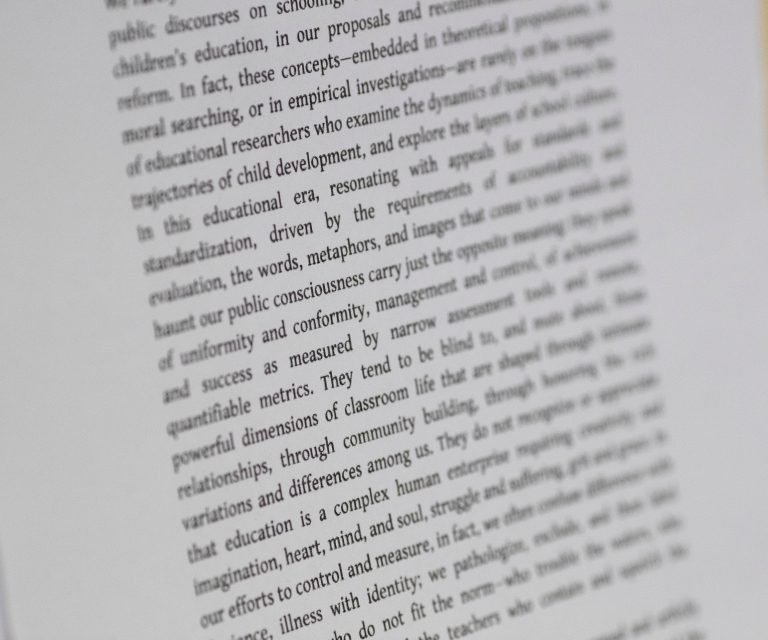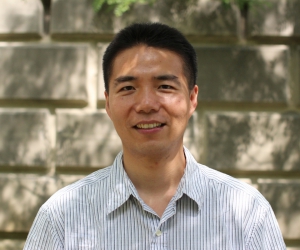
Professor Honored With National Literacy Research Award
Jon-Philip “Jay” Imbrenda, a faculty member at the University of Pittsburgh School of Education, is the recipient of the 2019 Arthur Applebee Award for Excellence in Research on Literacy, one of the highest honors in the field of literacy education.
The award is offered through a partnership between the Literacy Research Association and the School of Education at the University at Albany, State University of New York. It is given annually to honor an influential article in literacy research published in a refereed journal in the previous calendar year.
Imbrenda received the award for his article “Developing Academic Literacy: Breakthroughs and Barriers in College Access Intervention,” which appeared in Research in the Teaching of English in October 2018. In the article, Imbrenda reports findings from his analysis of a classroom intervention in which students from a comprehensive urban high school were given a curriculum designed to prepare them for the reading and writing demands of early college coursework. The study found that, in response to the curriculum, students’ scores on a university writing placement exam increased significantly. Moreover, an analysis of student writing demonstrated notable development in several areas of growth.
“Given the extent to which Arthur Applebee’s work influenced the curriculum we designed for this intervention, it is an incredible honor to receive an award that bears his namesake,” said Imbrenda. “Specifically, Applebee’s vision of curriculum as an ongoing conversation in culturally relevant domains served as the foundation for the program.”
Field Research in the Classroom
For the study, Imbrenda implemented an argumentative reasoning intervention over the course of one year at an urban high school in the northeast. The student population at the school was comprised of 54 percent Black students, 34 percent Latino students, and 10 percent White students. Ninety-six percent of all students were designated as economically disadvantaged.
Imbrenda worked with 11th and 12th grade students in an honors-tracked English classroom. He shared equal responsibility with the teacher for leading the class.
“I was extremely grateful for the cooperation of the school district. It’s not often that researchers are afforded such curricular freedom when working in public schools,” said Imbrenda.
Among the broad, open-ended questions that were used to structure the curriculum were “What does it mean to be smart? To what extent am I responsible to others? What makes someone resilient? How do popular media influence our lives?”
Students were then introduced to texts that highlighted problematic dimensions of each question.
“We chose these questions in response to a number of concerns, including what we believe would be interesting and relevant to the students, the texts and materials we had available to us, and the role the questions could play in helping the students to develop positive mindsets toward their academic identities,” said Imbrenda.
The Social Language of College
To assess the impact of the argumentative reasoning intervention, Imbrenda examined the writing portfolios of students and also conducted interviews with them. He also reviewed their scores on a university writing placement exam before, during, and after the argumentative intervention was introduced.
A key finding of Imbrenda’s study was that argumentative reasoning has powerful effects on students because it mirrors the social language of the college classroom. Developing fluency is a form of acculturating students to this unique academic community, which has its own forms and customs.
The study measured profound developmental effects in students. The effects were measured quantitatively by students’ increased scores on the university writing placement exam and qualitatively through their interview responses. Furthermore, the written work of students was coded for three developmental dimensions: reciprocity, indexicality, and intertextuality.
As Imbrenda wrote in the conclusion of his paper:
“While college readiness is often perceived in relation to the kinds of courses students take in high school, little attention has been given to the nature of the instruction taking place in those courses, especially instruction with a strong focus on writing. The dramatic increase in their placement exam scores indicate that they moved beyond shallow, underdeveloped approaches to academic writing and toward more legitimate efforts to engage in the social life of the classroom.”
Learn More
The Pitt School of Education offers a PhD in Language, Literacy, and Culture. Learn more and apply.




